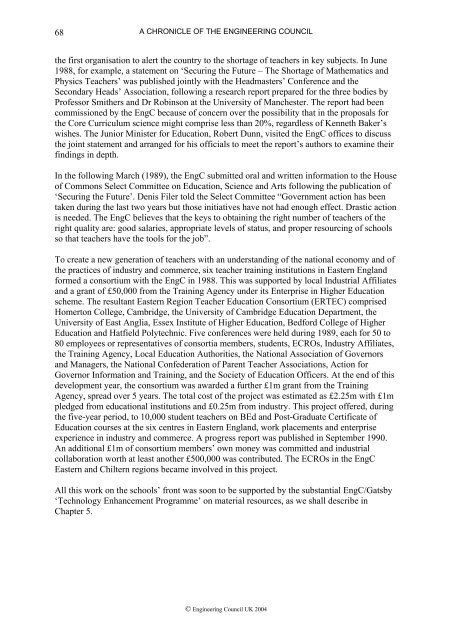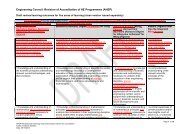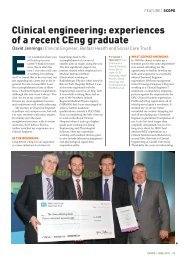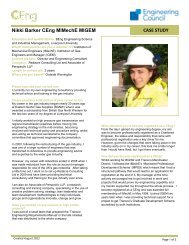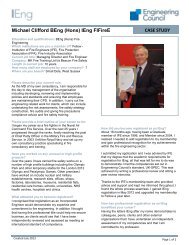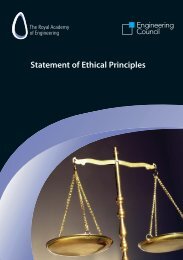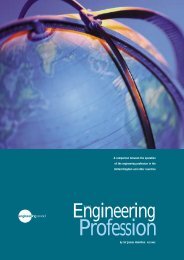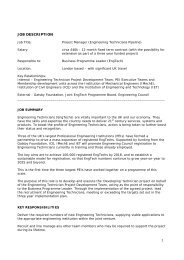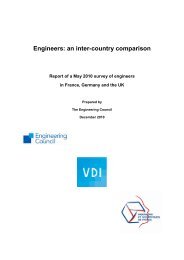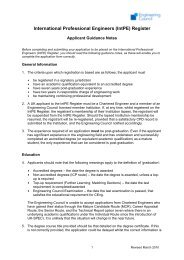An Engine for Change - A Chronicle of the Engineering Council
An Engine for Change - A Chronicle of the Engineering Council
An Engine for Change - A Chronicle of the Engineering Council
You also want an ePaper? Increase the reach of your titles
YUMPU automatically turns print PDFs into web optimized ePapers that Google loves.
68A CHRONICLE OF THE ENGINEERING COUNCIL<strong>the</strong> first organisation to alert <strong>the</strong> country to <strong>the</strong> shortage <strong>of</strong> teachers in key subjects. In June1988, <strong>for</strong> example, a statement on ‘Securing <strong>the</strong> Future – The Shortage <strong>of</strong> Ma<strong>the</strong>matics andPhysics Teachers’ was published jointly with <strong>the</strong> Headmasters’ Conference and <strong>the</strong>Secondary Heads’ Association, following a research report prepared <strong>for</strong> <strong>the</strong> three bodies byPr<strong>of</strong>essor Smi<strong>the</strong>rs and Dr Robinson at <strong>the</strong> University <strong>of</strong> Manchester. The report had beencommissioned by <strong>the</strong> EngC because <strong>of</strong> concern over <strong>the</strong> possibility that in <strong>the</strong> proposals <strong>for</strong><strong>the</strong> Core Curriculum science might comprise less than 20%, regardless <strong>of</strong> Kenneth Baker’swishes. The Junior Minister <strong>for</strong> Education, Robert Dunn, visited <strong>the</strong> EngC <strong>of</strong>fices to discuss<strong>the</strong> joint statement and arranged <strong>for</strong> his <strong>of</strong>ficials to meet <strong>the</strong> report’s authors to examine <strong>the</strong>irfindings in depth.In <strong>the</strong> following March (1989), <strong>the</strong> EngC submitted oral and written in<strong>for</strong>mation to <strong>the</strong> House<strong>of</strong> Commons Select Committee on Education, Science and Arts following <strong>the</strong> publication <strong>of</strong>‘Securing <strong>the</strong> Future’. Denis Filer told <strong>the</strong> Select Committee “Government action has beentaken during <strong>the</strong> last two years but those initiatives have not had enough effect. Drastic actionis needed. The EngC believes that <strong>the</strong> keys to obtaining <strong>the</strong> right number <strong>of</strong> teachers <strong>of</strong> <strong>the</strong>right quality are: good salaries, appropriate levels <strong>of</strong> status, and proper resourcing <strong>of</strong> schoolsso that teachers have <strong>the</strong> tools <strong>for</strong> <strong>the</strong> job”.To create a new generation <strong>of</strong> teachers with an understanding <strong>of</strong> <strong>the</strong> national economy and <strong>of</strong><strong>the</strong> practices <strong>of</strong> industry and commerce, six teacher training institutions in Eastern England<strong>for</strong>med a consortium with <strong>the</strong> EngC in 1988. This was supported by local Industrial Affiliatesand a grant <strong>of</strong> £50,000 from <strong>the</strong> Training Agency under its Enterprise in Higher Educationscheme. The resultant Eastern Region Teacher Education Consortium (ERTEC) comprisedHomerton College, Cambridge, <strong>the</strong> University <strong>of</strong> Cambridge Education Department, <strong>the</strong>University <strong>of</strong> East <strong>An</strong>glia, Essex Institute <strong>of</strong> Higher Education, Bed<strong>for</strong>d College <strong>of</strong> HigherEducation and Hatfield Polytechnic. Five conferences were held during 1989, each <strong>for</strong> 50 to80 employees or representatives <strong>of</strong> consortia members, students, ECROs, Industry Affiliates,<strong>the</strong> Training Agency, Local Education Authorities, <strong>the</strong> National Association <strong>of</strong> Governorsand Managers, <strong>the</strong> National Confederation <strong>of</strong> Parent Teacher Associations, Action <strong>for</strong>Governor In<strong>for</strong>mation and Training, and <strong>the</strong> Society <strong>of</strong> Education Officers. At <strong>the</strong> end <strong>of</strong> thisdevelopment year, <strong>the</strong> consortium was awarded a fur<strong>the</strong>r £1m grant from <strong>the</strong> TrainingAgency, spread over 5 years. The total cost <strong>of</strong> <strong>the</strong> project was estimated as £2.25m with £1mpledged from educational institutions and £0.25m from industry. This project <strong>of</strong>fered, during<strong>the</strong> five-year period, to 10,000 student teachers on BEd and Post-Graduate Certificate <strong>of</strong>Education courses at <strong>the</strong> six centres in Eastern England, work placements and enterpriseexperience in industry and commerce. A progress report was published in September 1990.<strong>An</strong> additional £1m <strong>of</strong> consortium members’ own money was committed and industrialcollaboration worth at least ano<strong>the</strong>r £500,000 was contributed. The ECROs in <strong>the</strong> EngCEastern and Chiltern regions became involved in this project.All this work on <strong>the</strong> schools’ front was soon to be supported by <strong>the</strong> substantial EngC/Gatsby‘Technology Enhancement Programme’ on material resources, as we shall describe inChapter 5.© <strong>Engine</strong>ering <strong>Council</strong> UK 2004


